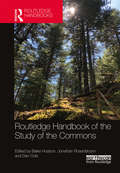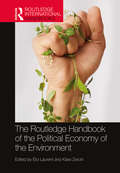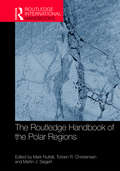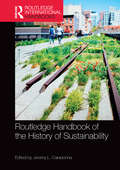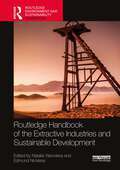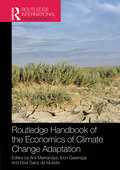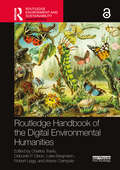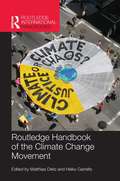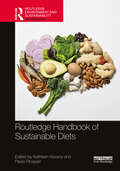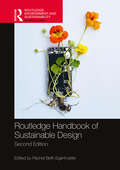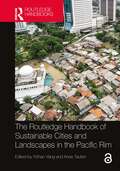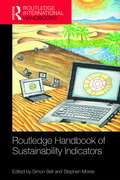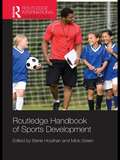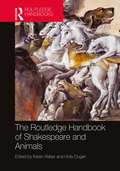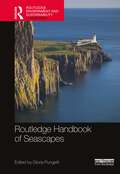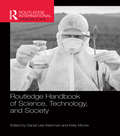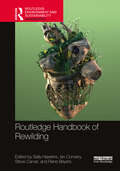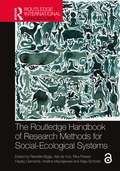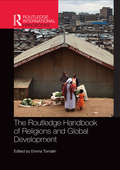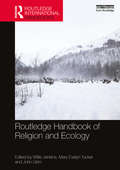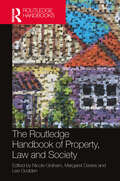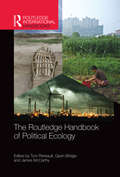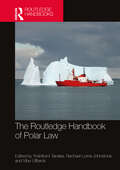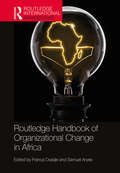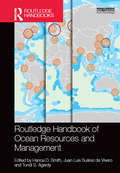- Table View
- List View
Routledge Handbook of the Study of the Commons
by Blake Hudson Jonathan Rosenbloom Dan ColeThe "commons" has come to mean many things to many people, and the term is often used inconsistently. The study of the commons has expanded dramatically since Garrett Hardin’s The Tragedy of the Commons (1968) popularized the dilemma faced by users of common pool resources. This comprehensive Handbook serves as a unique synthesis and resource for understanding how analytical frameworks developed within the literature assist in understanding the nature and management of commons resources. Such frameworks include those related to Institutional Analysis and Development, Social-Ecological Systems, and Polycentricity, among others. The book aggregates and analyses these frameworks to lay a foundation for exploring how they apply according to scholars across a wide range of disciplines. It includes an exploration of the unique problems arising in different disciplines of commons study, including natural resources (forests, oceans, water, energy, ecosystems, etc), economics, law, governance, the humanities, and intellectual property. It shows how the analytical frameworks discussed early in the book facilitate interdisciplinarity within commons scholarship. This interdisciplinary approach within the context of analytical frameworks helps facilitate a more complete understanding of the similarities and differences faced by commons resource users and managers, the usefulness of the commons lens as an analytical tool for studying resource management problems, and the best mechanisms by which to formulate policies aimed at addressing such problems.
The Routledge Handbook of the Political Economy of the Environment (Routledge International Handbooks)
by Éloi Laurent Klara ZwicklFeaturing a stellar international cast list of leading and cutting-edge scholars, The Routledge Handbook of the Political Economy of the Environment presents the state of the art of the discipline that considers ecological issues and crises from a political economy perspective. This collective volume sheds new light on the effect of economic and power inequality on environmental dynamics and, conversely, on the economic and social impact of environmental dynamics. The chapters gathered in this handbook make four original contributions to the field of political economy of the environment. First, they revisit essential concepts and methods of environmental economics in the light of their political economy. Second, they introduce readers to recent theoretical and empirical advances in key issues of political economy of the environment with a special focus on the relationship between inequality and environmental degradation, a nexus that has dramatically come into focus with the COVID crisis. Third, the authors of this handbook open the field to its critical global and regional dimensions: global issues, such as the environmental justice movement and inequality and climate change as well as regional issues such as agriculture systems, air pollution, natural resources appropriation and urban sustainability. Fourth and finally, the work shows how novel analysis can translate into new forms of public policy that require institutional reform and new policy tools. Ecosystems preservation, international climate negotiations and climate mitigation policies all have a strong distributional dimension that chapters point to. Pressing environmental policy such as carbon pricing and low-carbon and energy transitions entail numerous social issues that also need to be accounted for with new analytical and technological tools. This handbook will be an invaluable reference, research and teaching tool for anyone interested in political economy approaches to environmental issues and ecological crises.
The Routledge Handbook of the Polar Regions (Routledge International Handbooks)
by Mark Nuttall Torben R Christensen Martin SiegertThe Routledge Handbook of the Polar Regions is an authoritative guide to the Arctic and the Antarctic through an exploration of key areas of research in the physical and natural sciences and the social sciences and humanities. It presents 38 new and original contributions from leading figures and voices in polar research, policy and practice, as well as work from emerging scholars. This handbook aims to approach and understand the Polar Regions as places that are at the forefront of global conversations about some of the most pressing contemporary issues and research questions of our age. The volume provides a discussion of the similarities and differences between the two regions to help deepen understanding and knowledge. Major themes and issues are integrated in the comprehensive introduction chapter by the editors, who are top researchers in their respective fields. The contributions show how polar researchers engage with contemporary debates and use interdisciplinary and multidisciplinary approaches to address new developments as well as map out exciting trajectories for future work in the Arctic and the Antarctic. The handbook provides an easy access to key items of scholarly literature and material otherwise inaccessible or scattered throughout a variety of specialist journals and books. A unique one-stop research resource for researchers and policymakers with an interest in the Arctic and Antarctic, it is also a comprehensive reference work for graduate and advanced undergraduate students.
Routledge Handbook of the History of Sustainability (Routledge Environment and Sustainability Handbooks)
by Jeremy L. CaradonnaThe Routledge Handbook of the History of Sustainability is a far-reaching survey of the deep and contemporary history of sustainability. This innovative resource will help to define the history of sustainability as an identifiable field. It provides a unique resource for advanced undergraduates, graduate students, and scholars, and delivers essential context for understanding the current state and future path of the sustainability movement. The history of sustainability is an increasingly important domain within the discipline of history, which draws on an interdisciplinary set of fields, ranging from energy studies, transportation, and urbanism to environmental history, economics, and philosophy. Key sections in this handbook cover the historiography of sustainability, resilience and collapse in historical societies, the deep roots of sustainability (seventeenth century to nineteenth century), the recent history of sustainability (twentieth century to present), and core issues and key debates in sustainability. This handbook is an invaluable research and teaching tool for those interested in the history and development of sustainability and an essential resource for the many sustainability studies programs that now exist in the world's universities.
Routledge Handbook of the Extractive Industries and Sustainable Development (Routledge Environment and Sustainability Handbooks)
by Natalia YakovlevaThe Routledge Handbook of the Extractive Industries and Sustainable Development provides a cutting-edge, comprehensive overview of current trends, challenges and opportunities for metal and mineral production and use, in the context of climate change and the United Nations Sustainable Development Agenda 2030. Minerals and metals are used throughout the world in manufacturing, construction, infrastructure, production of electronics and consumer goods. Alongside this widespread use, extraction and processing of mineral resources take place in almost every nation at varying scales, both in developing countries and major developed nations. The chapters in this interdisciplinary handbook examine the international governance mechanisms regulating social, environmental and economic implications of mineral resource extraction and use. The original contributions, from a range of scholars, examine the relevance of the mining industry to the United Nations Sustainable Development Goals (SDGs), reviewing important themes such as local communities Indigenous peoples, gender equality and fair trade, showing how mining can influence global sustainable development. The chapters are organised into three sections: Global Trends in Mineral Resources Consumption and Production; Technology, Minerals and Sustainable Development; and Management of Social, Environmental and Economic Issues in the Mining Industry. This handbook will serve as an important resource for students and researchers of geology, geography, earth science, environmental studies, engineering, international development, sustainable development and business management, among others. It will also be of interest to professionals in governmental, international and non-governmental organisations that are working on issues of resource governance, environmental protection and social justice.
Routledge Handbook of the Economics of Climate Change Adaptation: Routledge Handbook Of The Economics Of Climate Change Adaptation (Routledge International Handbooks)
by Anil Markandya Ibon Galarraga Elisa Sainz de MurietaClimate change is one of the greatest challenges facing human kind owing to the great uncertainty regarding future impacts, which affect all regions and many ecosystems. Many publications deal with economic issues relating to mitigation policies, but the economics of adaptation to climate change has received comparatively little attention. However, this area is is critical and a central pillar of any adaptation strategy or plan and is the economic dimension, which therefore merits the increase in attention it is receiving. This book deals with the difficulties that face the economics of adaptation. Critical issues include: uncertainty; baselines; reversibility, flexibility and adaptive management; distributional impacts; discount rates and time horizons; mixing monetary and non-monetary evaluations and limits to the use of cost-benefit analysis; economy-wide impacts and cross-sectoral linkages. All of these are addressed in the book from the perspective of economics of adaptation. Other dimensions of adaptation are also included, such as the role of low- and middle-income countries, technology and the impacts of extreme events. This timely book will prove essential reading for international researchers and policy makers in the fields of natural resources, environmental economics and climate change.
Routledge Handbook of the Digital Environmental Humanities (Routledge Environment and Sustainability Handbooks)
by Charles Travis Deborah P. Dixon Luke Bergmann Robert Legg Arlene CrampsieThe Routledge Handbook of the Digital Environmental Humanities explores the digital methods and tools scholars use to observe, interpret, and manage nature in several different academic fields. Employing historical, philosophical, linguistic, literary, and cultural lenses, this handbook explores how the digital environmental humanities (DEH), as an emerging field, recognises its convergence with the environmental humanities. As such, it is empirically, critically, and ethically engaged in exploring digitally mediated, visualised, and parsed framings of past, present, and future environments, landscapes, and cultures. Currently, humanities, geographical, cartographical, informatic, and computing disciplines are finding a common space in the DEH and are bringing the use of digital applications, coding, and software into league with literary and cultural studies and the visual, film, and performing arts. In doing so, the DEH facilitates transdisciplinary encounters between fields as diverse as human cognition, gaming, bioinformatics and linguistics, social media, literature and history, music, painting, philology, philosophy, and the earth and environmental sciences. This handbook will be essential reading for those interested in the use of digital tools in the study of the environment from a wide range of disciplines and for those working in the environmental humanities more generally.
Routledge Handbook of the Climate Change Movement (Routledge Environment and Sustainability Handbooks)
by Matthias Dietz Heiko GarreltsThis handbook provides a comprehensive overview of the growing transnational climate movement. A dual focus on climate politics and civil society provides a hitherto unavailable broad and systematic analysis of the current global movement, highlighting how its dynamic and diverse character can play an important role in environmental politics and climate protection. The range of contributors, from well-known academics to activist-scholars, look at climate movements in the developed and developing world, north and south, small and large, central and marginal. The movement is examined as a whole and as single actors, thereby capturing its scope, structure, development, activities and influence. The book thoroughly addresses theoretical approaches, from classic social movement theory to the influence of environmental justice frames, and follows this with a systematic focus on regions, specific NGOs and activists, cases and strategies, as well as relations with peripheral groups. In its breadth, balance and depth, this accessible volume offers a fresh and important take on the question of social mobilization around climate change, making it an essential text for advanced undergraduates, postgraduate students and researchers in the social sciences.
Routledge Handbook of Sustainable Diets (Routledge Environment and Sustainability Handbooks)
by Kathleen Kevany and Paolo ProsperiThis handbook presents a must-read, comprehensive and state of the art overview of sustainable diets, an issue critical to the environment and the health and well-being of society. Sustainable diets seek to minimise and mitigate the significant negative impact food production has on the environment. Simultaneously they aim to address worrying health trends in food consumption through the promotion of healthy diets that reduce premature disability, disease and death. Within the Routledge Handbook of Sustainable Diets, creative, compassionate, critical, and collaborative solutions are called for across nations, across disciplines and sectors. In order to address these wide-ranging issues the volume is split into sections dealing with environmental strategies, health and well-being, education and public engagement, social policies and food environments, transformations and food movements, economics and trade, design and measurement mechanisms and food sovereignty. Comprising of contributions from up and coming and established academics, the handbook provides a global, multi-disciplinary assessment of sustainable diets, drawing on case studies from regions across the world. The handbook concludes with a call to action, which provides readers with a comprehensive map of strategies that could dramatically increase sustainability and help to reverse global warming, diet related non-communicable diseases, and oppression and racism. This decisive collection is essential reading for students, researchers, practitioners, and policymakers concerned with promoting sustainable diets and thus establishing a sustainable food system to ensure access to healthy and nutritious food for all.
Routledge Handbook of Sustainable Design (Routledge Environment and Sustainability Handbooks)
by Rachel Beth EgenhoeferThe Routledge Handbook of Sustainable Design considers the design, not only of artifacts, but of structures, systems, and interactions in the context of sustaining our shared planet. This revised edition introduces new and updated chapters, as well as a new section on pedagogy for sustainable design. With authors from around the world, design is positioned in context with recent crises such as global pandemics, racial reckoning, political unrest, and natural disasters. Just as design is an interdisciplinary field, the climate crisis is deeply tangled in racial justice, gender justice, global health, economics, trade, and more. Divided into six sections, it presents a holistic approach to understanding the many facets of sustainable design: Part 1: Systems and Design Part 2: Complexities of Sustainable Design Part 3: Community Engaged Design for Local and Global Diversity Part 4: Design for Sustainable Behaviors Part 5: Design Futures Part 6: Pedagogy in Design for Sustainability Arguing that design needs to restore, regenerate, and rejuvenate our planet and people, this handbook will be invaluable to researchers, students, and practitioners across all subdisciplines of design, architecture, business, energy management, visual arts, and environmental studies, among others.
The Routledge Handbook of Sustainable Cities and Landscapes in the Pacific Rim (Routledge Environment and Sustainability Handbooks)
by Yizhao YangThis handbook addresses a growing list of challenges faced by regions and cities in the Pacific Rim, drawing connections around the what, why, and how questions that are fundamental to sustainable development policies and planning practices. These include the connection between cities and surrounding landscapes, across different boundaries and scales; the persistence of environmental and development inequities; and the growing impacts of global climate change, including how physical conditions and social implications are being anticipated and addressed. Building upon localized knowledge and contextualized experiences, this edited collection brings attention to place-based approaches across the Pacific Rim and makes an important contribution to the scholarly and practical understanding of sustainable urban development models that have mostly emerged out of the Western experiences. Nine sections, each grounded in research, dialogue, and collaboration with practical examples and analysis, focus on a theme or dimension that carries critical impacts on a holistic vision of city-landscape development, such as resilient communities, ecosystem services and biodiversity, energy, water, health, and planning and engagement. This international edited collection will appeal to academics and students engaged in research involving landscape architecture, architecture, planning, public policy, law, urban studies, geography, environmental science, and area studies. It also informs policy makers, professionals, and advocates of actionable knowledge and adoptable ideas by connecting those issues with the Sustainable Development Goals (SDGs) of the United Nations. The collection of writings presented in this book speaks to multiyear collaboration of scholars through the APRU Sustainable Cities and Landscapes (SCL) Program and its global network, facilitated by SCL Annual Conferences and involving more than 100 contributors from more than 30 institutions.
Routledge Handbook of Sustainability Indicators (Routledge International Handbooks)
by Simon Bell Stephen MorseThis handbook provides researchers and students with an overview of the field of sustainability indicators (SIs) as applied in the interdisciplinary field of sustainable development. The editors have sought to include views from the center ground of SI development but also divergent ideas which represent some of the diverse, challenging and even edgy observations which are prominent in the wider field of SI thinking. The contributions in this handbook: • clearly set out the theoretical background and history of SIs, their origins, roots and initial goals • expand on the disciplines and modalities employed to develop SIs of various kinds • assess the various ways in which SI data are gathered and the availability (over space and time) and quality issues that surround them • explore the multiplex world of SIs as expressed in agencies around the world, via examples of SI practice and the lessons that have emerged from them • critically review the progress that SIs have made over the last 30 years • express the divergence of views which are held about the value of SIs, including differing theories on their efficacy, efficiency and ethics • explore the frontier of contemporary SI thinking, reviewing ante/post and systemic alternatives This multidisciplinary and international handbook will be of great interest to researchers, students and practitioners working in sustainability research and practice.
Routledge Handbook of Sports Development (Routledge International Handbooks)
by Barrie Houlihan Mick GreenSports development has become a prominent concern within both the academic study of sport and within the organisation and administration of sport. Now available in paperback, the Routledge Handbook of Sports Development is the first book to comprehensively map the wide-ranging territory of sports development as an activity and as a policy field, and to offer a definitive survey of current academic knowledge and professional practice. Spanning the whole spectrum of activity in sports development, from youth sport and mass participation to the development of elite athletes, the book identifies and defines the core functions of sports development, exploring the interface between sports development and cognate fields such as education, coaching, community welfare and policy. The book presents important new studies of sports development around the world, illustrating the breadth of practice within and between countries, and examines the most important issues facing practitioners within sports development today, from child protection to partnership working. With unparalleled depth and breadth of coverage, the Routledge Handbook of Sports Development is the definitive guide to policy, practice and research in sports development. It is essential reading for all students, researchers and professionals with an interest in this important and rapidly evolving discipline.
The Routledge Handbook of Shakespeare and Animals (Routledge Literature Handbooks)
by Karen Raber and Holly DuganShakespeare’s plays have a long and varied performance history. The relevance of his plays in literary studies cannot be understated, but only recently have scholars been looking into the presence and significance of animals within the canon. Readers will quickly find—without having to do extensive research—that the plays are teeming with animals! In this Handbook, Karen Raber and Holly Dugan delve deep into Shakespeare’s World to illuminate and understand the use of animals in his span of work. This volume supplies a valuable resource, offering a broad and thorough grounding in the many ways animal references and the appearance of actual animals in the plays can be interpreted. It provides a thorough overview; demonstrates rigorous, original research; and charts new frontiers in the field through a broad variety of contributions from an international group of well-known and respected scholars.
Routledge Handbook of Seascapes (Routledge Environment and Sustainability Handbooks)
by Gloria PungettiSeascape studies have developed in response to questions arising from composite correlations such as coastal, island and marine research, social requirements, landscape design and planning, marine ecology, and environment and resource management. This global volume is the first comprehensive overview to provide a solid foundation on the concept of seascape, with the latest research findings from leading experts across a variety of fields, offering a holistic approach to seascape linking nature with culture, and theory with practice. Divided into six parts, it includes over 30 chapters from contributors around the world. Pioneering methods with illustrated case studies from the Mediterranean, Scandinavia, North Sea, North America and Asia serve as examples for future seascape development, conservation and governance. An important and extremely timely resource, the Routledge Handbook of Seascapes provides academics, practitioners, NGOs, consultants and government officials with a broad overview of current research and practice for future application and advance worldwide.
Routledge Handbook of Science, Technology, and Society (Routledge International Handbooks)
by Daniel Lee Kleinman Kelly MooreOver the last decade or so, the field of science and technology studies (STS) has become an intellectually dynamic interdisciplinary arena. Concepts, methods, and theoretical perspectives are being drawn both from long-established and relatively young disciplines. From its origins in philosophical and political debates about the creation and use of scientific knowledge, STS has become a wide and deep space for the consideration of the place of science and technology in the world, past and present. The Routledge Handbook of Science, Technology and Society seeks to capture the dynamism and breadth of the field by presenting work that pushes the reader to think about science and technology and their intersections with social life in new ways. The interdisciplinary contributions by international experts in this handbook are organized around six topic areas: embodiment consuming technoscience digitization environments science as work rules and standards This volume highlights a range of theoretical and empirical approaches to some of the persistent – and new – questions in the field. It will be useful for students and scholars throughout the social sciences and humanities, including in science and technology studies, history, geography, critical race studies, sociology, communications, women’s and gender studies, anthropology, and political science.
Routledge Handbook of Rewilding (Routledge Environment and Sustainability Handbooks)
by Sally Hawkins Ian Convery Steve Carver Rene BeyersThis handbook provides a comprehensive overview of the history, theory, and current practices of rewilding. Rewilding offers a transformational paradigm shift in conservation thinking, and as such is increasingly of interest to academics, policymakers, and practitioners. However, as a rapidly emerging area of conservation, the term has often been defined and used in a variety of different ways (both temporally and spatially). There is, therefore, the need for a comprehensive assessment of this field, and the Routledge Handbook of Rewilding fills this lacuna. The handbook is organised into four sections to reflect key areas of rewilding theory, practice, and debate: the evolution of rewilding, theoretical and practical underpinnings, applications and impacts, and the ethics and philosophy of rewilding. Drawing on a range of international case studies the handbook addresses many of the key issues, including land acquisition and longer-term planning, transitioning from restoration (human-led, nature enabled) to rewilding (nature-led, human enabled), and the role of political and social transformational change. Led by an editorial team who have extensive experience researching and practising rewilding, this handbook is essential reading for students, academics and practitioners interested in rewilding, ecological restoration, natural resource management and conservation.
The Routledge Handbook of Research Methods for Social-Ecological Systems (Routledge International Handbooks)
by Reinette Biggs Alta De Vos Rika Preiser Hayley Clements Kristine Maciejewski Maja SchlüterThe Routledge Handbook of Research Methods for Social-Ecological Systems provides a synthetic guide to the range of methods that can be employed in social-ecological systems (SES) research. The book is primarily targeted at graduate students, lecturers and researchers working on SES, and has been written in a style that is accessible to readers entering the field from a variety of different disciplinary backgrounds. Each chapter discusses the types of SES questions to which the particular methods are suited and the potential resources and skills required for their implementation, and provides practical examples of the application of the methods. In addition, the book contains a conceptual and practical introduction to SES research, a discussion of key gaps and frontiers in SES research methods, and a glossary of key terms in SES research. Contributions from 97 different authors, situated at SES research hubs in 16 countries around the world, including South Africa, Sweden, Germany and Australia, bring a wealth of expertise and experience to this book. The first book to provide a guide and introduction specifically focused on methods for studying SES, this book will be of great interest to students and scholars of sustainability science, environmental management, global environmental change studies and environmental governance. The book will also be of interest to upper-level undergraduates and professionals working at the science–policy interface in the environmental arena.
The Routledge Handbook of Religions and Global Development (Routledge International Handbooks)
by Emma TomalinThis Handbook provides a cutting-edge survey of the state of research on religions and global development. Part one highlights critical debates that have emerged within research on religions and development, particularly with respect to theoretical, conceptual and methodological considerations, from the perspective of development studies and its associated disciplines. Parts two to six look at different regional and national development contexts and the place of religion within these. These parts integrate and examine the critical debates raised in part one within empirical case studies from a range of religions and regions. Different religions are situated within actual locations and case studies thus allowing a detailed and contextual understanding of their relationships to development to emerge. Part seven examines the links between some important areas within development policy and practice where religion is now being considered, including: Faith-Based Organisations and Development Public Health, Religion and Development Human rights, Religion and Development Sustainable Development, Climate Change and Religion Global Institutions and Religious Engagement in Development Economic Development and Religion Religion, Development and Fragile States Development and Faith-Based Education Taking a global approach, the Handbook covers Africa, Latin America, South Asia, East and South-East Asia, and the Middle East. It is essential reading for students and researchers in development studies and religious studies, and is highly relevant to those working in area studies, as well as a range of disciplines, from theology, anthropology and economics to geography, international relations, politics and sociology.
Routledge Handbook of Religion and Ecology (Routledge Environment and Sustainability Handbooks)
by Willis Jenkins, Mary Evelyn Tucker and John GrimThe moral values and interpretive systems of religions are crucially involved in how people imagine the challenges of sustainability and how societies mobilize to enhance ecosystem resilience and human well-being. The Routledge Handbook of Religion and Ecology provides the most comprehensive and authoritative overview of the field. It encourages both appreciative and critical angles regarding religious traditions, communities, attitude, and practices. It presents contrasting ways of thinking about "religion" and about "ecology" and about ways of connecting the two terms. Written by a team of leading international experts, the Handbook discusses dynamics of change within religious traditions as well as their roles in responding to global challenges such as climate change, water, conservation, food and population. It explores the interpretations of indigenous traditions regarding modern environmental problems drawing on such concepts as lifeway and indigenous knowledge. This volume uniquely intersects the field of religion and ecology with new directions within the humanities and the sciences. This interdisciplinary volume is an essential reference for scholars and students across the social sciences and humanities and for all those looking to understand the significance of religion in environmental studies and policy.
The Routledge Handbook of Property, Law and Society
by Nicole Graham, Margaret Davies and Lee GoddenThis handbook brings together diverse perspectives, major topics, and multiple approaches to one of the biggest legal institutions in society: property. Property touches on many fundamental human questions. It involves decisions about power, economy, morality, work, and ecology. It also involves ideas about where humans fit in the world and how humans relate to more-than-human life. This book will ask in myriad ways such questions as: what property means, what kinds of property there are, what is and should be the relationship between owned and owner, and what is the impact of different forms of property on life in this world? Drawing on a range of socio-legal and empirical methodologies, renowned scholars and rising stars in property from around the world present current issues and map future directions in research. Coming from the place of law but reaching out through cognate disciplines, this handbook provides a comprehensive and accessible survey of current research at the interface of property, society, and the environment. This handbook will appeal to students and researchers across a range of disciplines, including law, sociology, geography, history, and economics.
The Routledge Handbook of Political Ecology (Routledge International Handbooks)
by Gavin Bridge Tom Perreault James McCarthyThe Routledge Handbook of Political Ecology presents a comprehensive and authoritative examination of the rapidly growing field of political ecology. Located at the intersection of geography, anthropology, sociology, and environmental history, political ecology is one of the most vibrant and conceptually diverse fields of inquiry into nature-society relations within the social sciences. The Handbook serves as an essential guide to this rapidly evolving intellectual landscape. With contributions from over 50 leading authors, the Handbook presents a systematic overview of political ecology’s origins, practices and core concerns, and aims to advance both ongoing and emerging debates. While there are numerous edited volumes, textbooks, and monographs under the heading ‘political ecology,’ these have tended to be relatively narrow in scope, either as collections of empirically based (mostly case study) research on a given theme, or broad overviews of the field aimed at undergraduate audiences. The Routledge Handbook of Political Ecology is the first systematic, comprehensive overview of the field. With authors from North and South America, Europe, Australia and elsewhere, the Handbook of Political Ecology provides a state of the art examination of political ecology; addresses ongoing and emerging debates in this rapidly evolving field; and charts new agendas for research, policy, and activism. The Routledge Handbook of Political Ecology introduces political ecology as an interdisciplinary academic field. By presenting a ‘state of the art’ examination of the field, it will serve as an invaluable resource for students and scholars. It not only critically reviews the key debates in the field, but develops them. The Handbook will serve as an excellent resource for graduate and advanced undergraduate teaching, and is a key reference text for geographers, anthropologists, sociologists, environmental historians, and others working in and around political ecology.
The Routledge Handbook of Polar Law (Routledge Handbooks in Law)
by Yoshifumi Tanaka Rachael Lorna Johnstone Vibe UlfbeckPolar law describes the normative frameworks that govern the relationships between humans, States, Peoples, institutions, land and resources in the Arctic and the Antarctic. These two regions are superficially similar in terms of natural environmental conditions but the overarching frameworks that apply are fundamentally different. The Routledge Handbook of Polar Law explores the legal orders in the Arctic and Antarctic in a comparative perspective, identifying similarities as well as differences. It points to a distinct discipline of "Polar law" as the body of rules governing actors, spaces and institutions at the Poles. Four main features define the collection: the Arctic-Antarctic interface; the interaction between global, regional and domestic legal regimes; the rights of Indigenous Peoples; and the increasing importance of private law. While these broad themes have been addressed to varying extents elsewhere, the editors believe that this Handbook brings them together to create a comprehensive (if never exhaustive) account of what constitutes Polar law today. Leading scholars in public international and private law as well as experts in related fields come together to offer unique insights into polar law as a burgeoning discipline.
Routledge Handbook of Organizational Change in Africa (Routledge International Handbooks)
by Franca Ovadje Samuel AryeeAlthough change management and therefore effective adaptation to environmental complexity is considered a uniquely human cultural activity, the extensive change management literature is largely based on the experiences of organizations in the advanced economies of the West. As the economies of African countries become increasingly open, African organizations will need to be agile in order to adapt and grow in a dynamic, global environment. Currently, there is a dearth of contextualized knowledge on change management within Africa, but this handbook aims to address this by bringing together a wide range of experts to explore organizational change and change management from an African context. The handbook adopts a multidisciplinary (historical, philosophical, processual, and strategic) perspective as well as empirical accounts of change management. It addresses such issues as: What are the external and internal pressures for change? What is the content and process of change management? What are the essentials of effective change management? How can change management be theorized from an African perspective? What sort of leadership can best align with change management demands in an African context? How do organizations build internal change management capability? It is hoped that answers to these questions contained in the handbook will provide a contextualized understanding of change management which African organizations and scholars can leverage to respond to the threats and opportunities inherent in their increasingly dynamic environment. The handbook should constitute an essential reference for academics, researchers, and advanced students of change management, development studies, and African studies, as well as practitioners.
Routledge Handbook of Ocean Resources and Management (Routledge Environment and Sustainability Handbooks)
by Hance D. Smith Tundi S. Agardy Juan Luis Suárez de ViveroThis comprehensive handbook provides a global overview of ocean resources and management by focusing on critical issues relating to human development and the marine environment, their interrelationships as expressed through the uses of the sea as a resource, and the regional expression of these themes. The underlying approach is geographical, with prominence given to the biosphere, political arrangements and regional patterns – all considered to be especially crucial to the human understanding required for the use and management of the world's oceans. Part one addresses key themes in our knowledge of relationships between people and the sea on a global scale, including economic and political issues, and understanding and managing marine environments. Part two provides a systematic review of the uses of the sea, grouped into food, ocean space, materials and energy, and the sea as an environmental resource. Part three on the geography of the sea considers management strategies especially related to the state system, and regional management developments in both core economic regions and the developing periphery. The primary themes within each chapter are governance (including institutional and legal bases); policy – sets of ideas governing management; and management, both technical and general.
